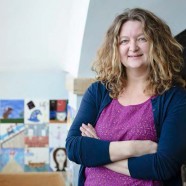
Heather Sugrue, math department chair, along with the faculty in her department, have undertaken a comprehensive review of math at Milton.
Math is taking the lead in a renewal process that every department at Milton will conduct, in sequence and at regular intervals.
“Ongoing, rigorous, curriculum renewal” is a key tenet of the Strategic Plan adopted by the trustees in January 2013. One of the central architects on the Strategic Planning team, Heather co-chaired its Student Life Task Force.
Heather is pioneering the first major example of the process the plan intends. Milton’s priority goal for the academic program is excellence and relevance: the two attributes paired together. Regular evaluations—highlighting what to preserve, what to improve, and what innovation to pursue—will give us the impetus and the information to define curriculum astutely over time.
When did the department begin working on this idea?
Really, we’ve been building on it for at least two years. David Ball (principal) opened school by talking with faculty about refining all of our evaluative processes. He talked with department chairs about how productive and healthy external reviews would be for future growth.
What have you taken on?
The work is really comprehensive: lots of introspection among the faculty about what, how, when and why we teach what we do; student and alumni surveys; a weeklong visit by an outside team of educators. Then comes the work of analyzing what we’ve learned.
What do you expect?
We’re looking at the future, and I’m really confident that we’ll have the kind of solid information we need to make the best decisions. Even preparing for the study—looking at student evaluations, getting ready for the visiting team—has been so productive for all of us.
What are the upsides of going first?
We can create the assessment ourselves, and adjust as we go forward. We can also make sure we get information that’s helpful to us. Also, others will follow our lead, improve on the model and adapt it.
Have you found any advice particularly helpful?
Having Jackie Bonenfant (academic dean and former math department chair) so involved is great. Michael Edgar (science department chair), who was involved in a similar process for science some years ago, told me to make sure to ask about the hard issues upfront. That was good advice.
You surveyed alumni about their experience with math at Milton. Did they respond?
Yes, and in big numbers. We sent the survey to everyone who graduated from 2003 to 2012, and 28 percent participated. We have more than 400 responses, and people told us they were very happy to be asked for their thoughts.
How about students?
No surprise, the students were great. We sent the survey to students in Class I and Class II, and 70 percent completed it.
Who’s on the visiting team?
Six educators are coming to campus. The chair of the team educates math educators at Worcester Polytechnic Institute. One is a parent of a Milton grad who is involved in the industry. A third spent many years as the math department chair at a K–12 school and now works in higher education. Another is a math teacher from a private school known for its exceptional math program. Finally, two on the team will focus on K–8.
How long will they be on campus?
From Monday through Friday—a full week of immersion.
What are some of the side benefits?
Teachers have moved from a little understandable reticence to being excited about what we’re learning and what we could be doing. We’ve uncovered new and important questions that we can discuss with each other, over time, as well. Maybe most importantly, more than half of us have been off campus looking at other programs, and that number will grow by the year’s end.
What do people need to know about this kind of curriculum review?
It takes time, money, focus, help from academic leaders, and a willingness to adjust, tweak and persist. It’s extremely important and very absorbing. And in the meantime, teaching and advising and coaching and dorm parenting goes on.
It’s an absolutely invaluable and transformative effort. It will even more distinctly define teaching and learning at Milton, department by department, over time.



